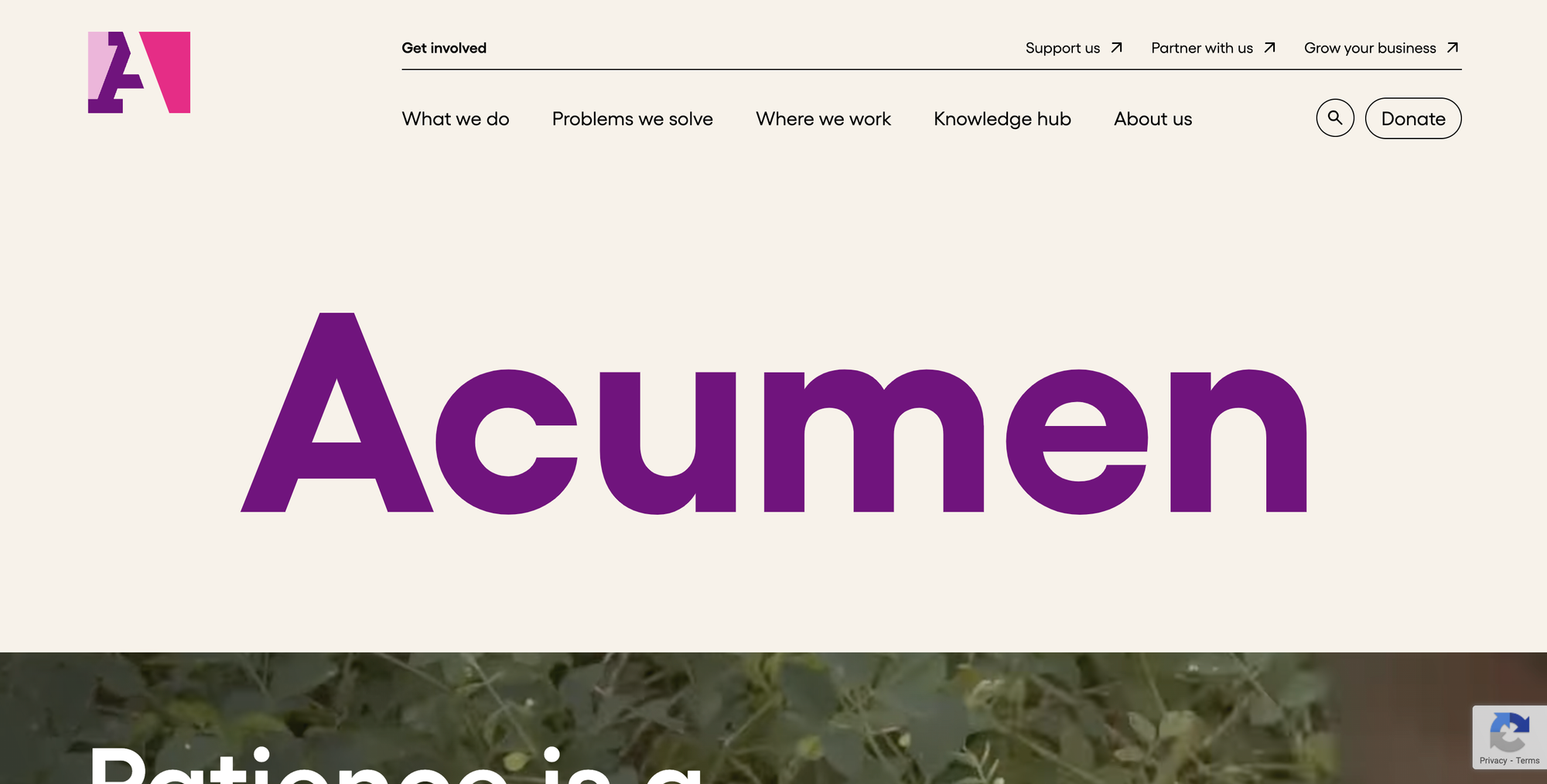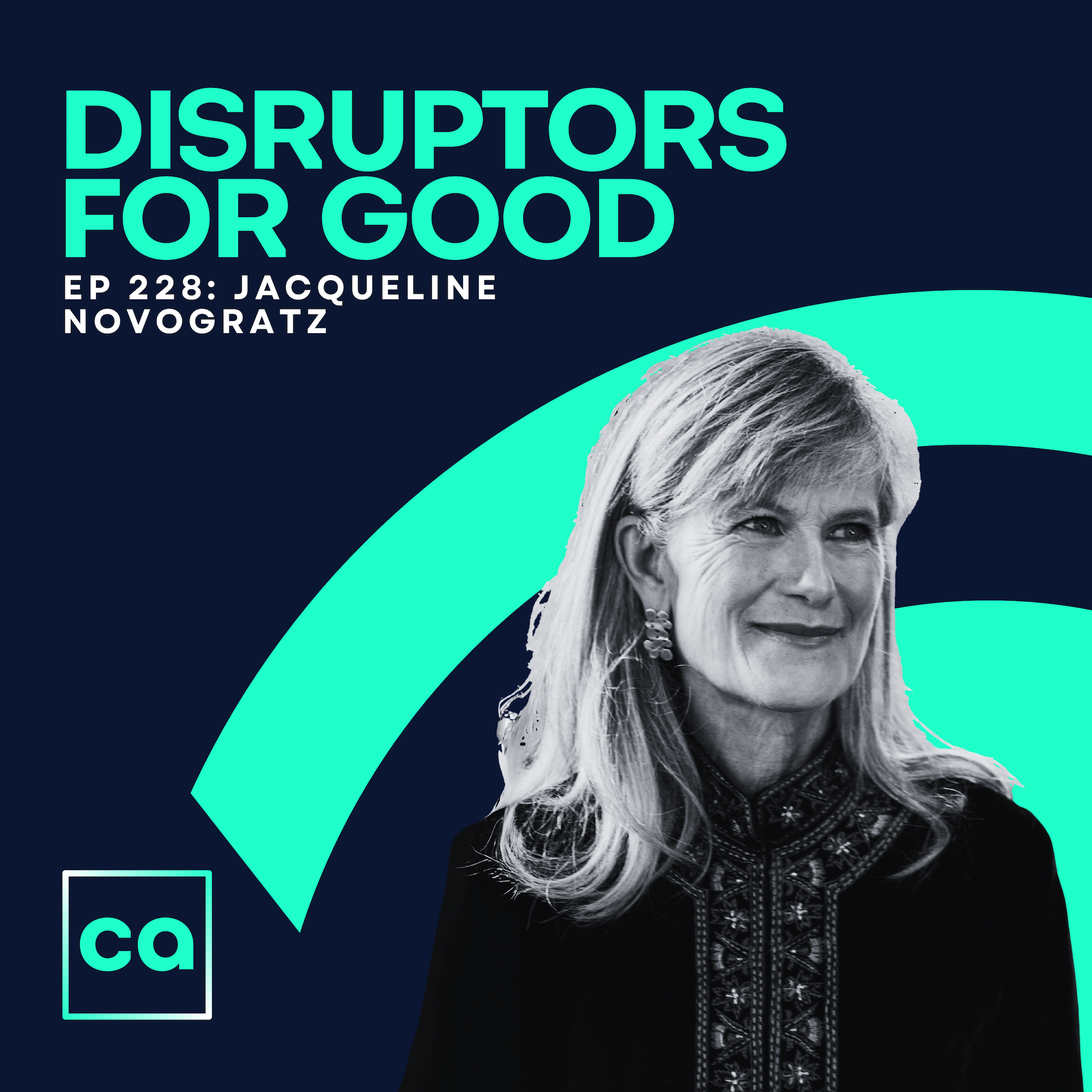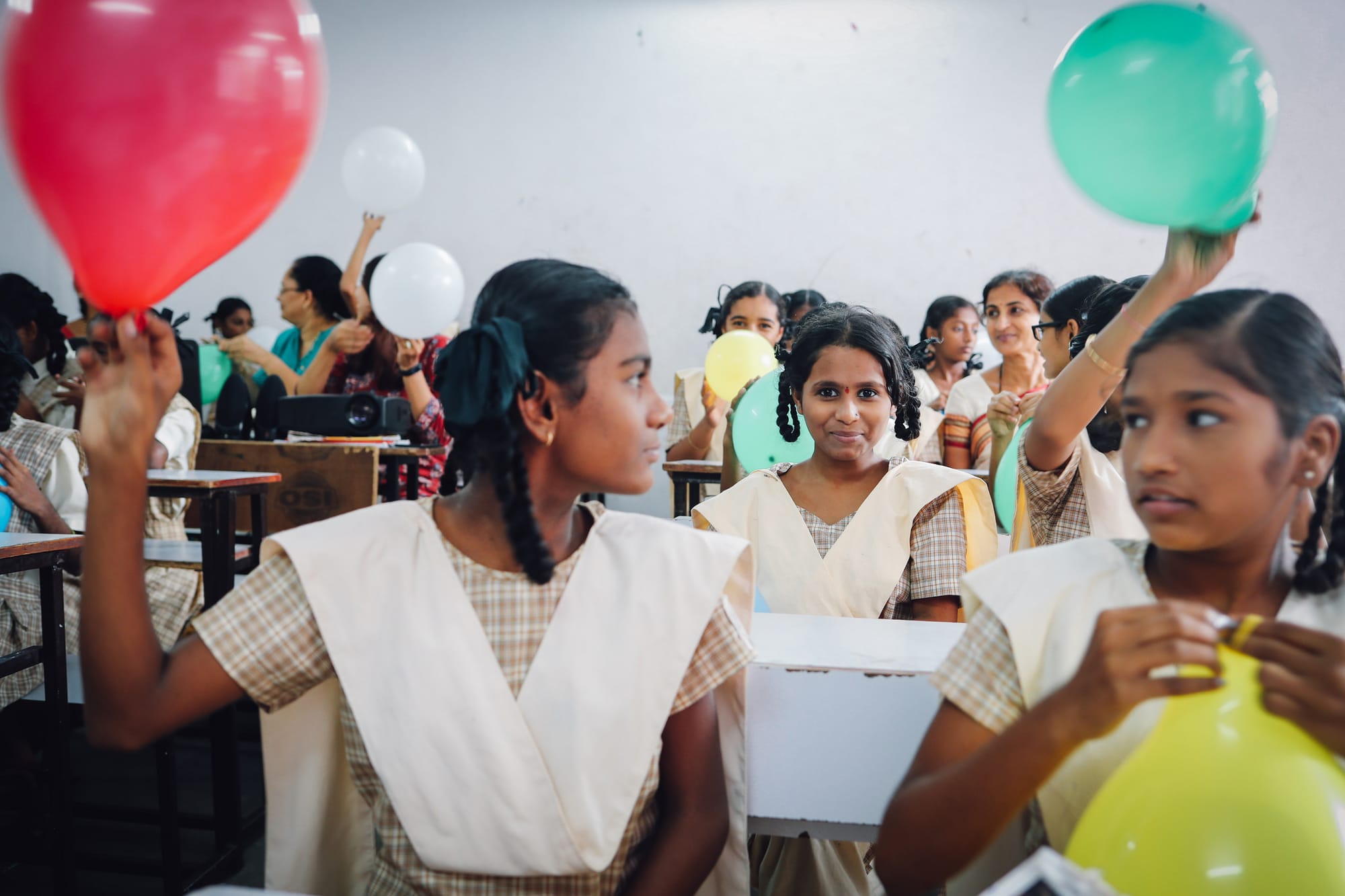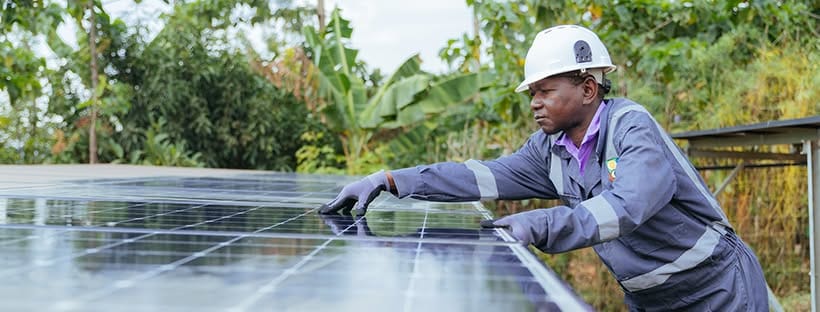In episode 228 of the Disruptors for GOOD Podcast, I had the pleasure of speaking with Jacqueline Novogratz, Founder & CEO of Acumen, about her journey and impacting over 650 million lives through social entrepreneurship.
Subscribe on Apple Podcasts
Subscribe on Spotify
Subscribe on Amazon Music
From Chase Bank to Kigali: A Journey Rooted in Empathy
Jacqueline’s journey began not with a grand strategy, but with a moment of clarity while working in Rwanda in the late 1980s, where she helped launch one of the country’s first microfinance institutions.
There, she witnessed how markets could be harnessed to empower individuals—especially women—but also saw how fragmented and fragile traditional aid systems were.
"Access isn't enough; capability is key."
This insight became a core pillar of her mission: empowering entrepreneurs, not just giving handouts.
That idea would eventually become Acumen.

The Founding of Acumen: Bridging Markets and Philanthropy
Founded in 2001, Acumen was created to tackle what Jacqueline calls "the blue flame" space—the gap between pure philanthropy and market-driven capitalism. Acumen uses “patient capital” to invest in entrepreneurs solving problems in energy, agriculture, healthcare, education, and workforce development.
"We need to reframe what risk means in investing."
Acumen has since invested over $150 million into companies that have impacted millions of people in low-income communities across Africa, South Asia, Latin America, and the U.S. But the goal isn’t just scale—it’s systemic change.

What It Takes to Build Markets That Work for the Poor
Jacqueline explains that creating sustainable impact requires far more than capital—it demands a deep understanding of local contexts, cultural norms, and the lived experiences of the communities being served.
"The status quo exists for a reason; change is hard."
She emphasizes that real progress depends on:
- Entrepreneurial courage
- Long-term thinking
- Collaboration with governments and civil society
Acumen works to build "markets with moral imagination", where value creation doesn’t come at the cost of human dignity or environmental degradation.

This episode is powered by PIF Advisory.
PIF Advisory is a global services firm that empowers startups and mission-driven companies with expert financial, operational, and strategic support.
Whether you're launching, scaling, or preparing for a funding round, PIF Advisory offers full-cycle bookkeeping, outsourced CFO services, growth marketing, entity management, and more—delivered by professionals and backed by a global investor network.
Education, Circular Impact, and the Future of Social Entrepreneurship
Another major focus of Acumen is education. Through the Acumen Academy, they’ve trained over 1,800 social enterprise leaders, equipping them with tools in moral leadership, storytelling, and systems thinking.
Jacqueline envisions a circular economy of impact investing, where capital flows to and from communities, creating sustainable, inclusive systems over time.
"Resilience and moral imagination are essential qualities for social entrepreneurs."
She sees the future of impact rooted in innovative partnerships—between private and public sectors, startups and institutions, and across geographies.

A Legacy of Courage and Compassion
As Jacqueline looks ahead, her message is clear: we need a new moral framework for capitalism—one that measures success not just in returns, but in human dignity and long-term value for society.
Her story is a reminder that systems can change, markets can heal, and entrepreneurs—when supported with the right kind of capital and community—can solve the world’s most pressing problems.
Interview Transcript
Grant:
Awesome. Well, thank you so much, Jacqueline, for joining me today. It’s a great honor. I’ve been running Causeartist since 2013, and through that journey, I’ve always come across Acumen—reading about it, following its impact. And of course, all the things you’ve done have inspired a lot of people, including me. So thank you for taking the time.
Jacqueline:
Thanks so much, Grant. I'm really happy to be here.
Grant:
I usually like to start from the beginning. I know it’s hard to pinpoint a starting place, but maybe we can begin after college—your time at Chase Bank and working in international banking. How did that experience shape the rest of your journey?
Jacqueline:
That’s a good place to start. I was sort of an accidental banker. I started at Chase Manhattan Bank, partly because it gave me the chance to travel to 40 countries in just three years—which was rare back then. But even then, I could see the same patterns we still see today: financial markets overlooking and sometimes exploiting the poor. That made me think deeply about both the power and limitations of business, especially when finance isn’t structured to include everyone.
That’s what led me to Rwanda, where I helped start the country’s first microfinance bank with a group of incredible Rwandan women. I saw firsthand the power of access to markets, but also realized that access alone isn’t enough. You need capability, too. And more than that, dignity and agency are central to people’s ability to transform their own lives.
That journey was interrupted by the Rwandan genocide—a moment that showed me how inequality and fear can be weaponized. All of those experiences together made it clear that there needed to be a new way. Not simply markets or aid, but something that took the best of both. That’s how Acumen was born.
Grant:
Were there early successes in Rwanda that helped shape your thinking about Acumen’s global potential?
Jacqueline:
Yes. With microfinance, what struck me wasn’t just the financial tool itself—it was how quickly access to banking changed things. Before we started, women needed their husband’s signature to open a bank account. Then, suddenly, they could participate in the economy. But I also noticed that while they could increase income, they weren’t necessarily creating jobs or escaping poverty.
So I also started a bakery. We cornered the snack food market in the country! These women, many of them illiterate, learned how to price products, understand profit and loss, and maintain quality control. It wasn’t rocket science—it was opportunity. That’s when I realized we had to build businesses that employ people. That was the lightbulb moment for me: creating jobs and industries is the true unlock.
Grant:
And that concept—building markets—is something Acumen has become known for. It’s such a powerful idea, but hard to grasp. Can you break it down for those who may not be familiar?
Jacqueline:
Absolutely. Acumen is a global nonprofit that does three core things:
- Acumen Academy – We identify and support social entrepreneurs from all walks of life—nonprofit and for-profit alike. We connect, train, and build a community of values-driven changemakers because this work can be incredibly lonely. And the Academy is intentionally diverse to bridge divides across countries and cultures.
- Patient Capital – When we see a founder with a fledgling business that’s addressing poverty in energy, healthcare, education, or agriculture, we invest with the understanding that it takes time. We accompany them through years of trial and error—helping them build trust, infrastructure, and pricing models.
- Growth Capital – Now that some of these markets are more established, we manage for-profit funds (approaching $500 million) that can lead larger investment rounds alongside traditional investors.
All of this creates a circular impact economy. We don’t just invest—we generate insights, develop frameworks, and share what we learn with the world.
Grant:
How do you actually build a market from scratch? What does that look like on the ground?
Jacqueline:
It’s messy—and no one ever asks that! I’ll never forget our first board meeting in Rwanda. We were sitting in a living room, one of the women had just given birth and was still in her nightgown. But that’s where it starts: a few people, a dream, and the courage to take a first step.
Let me give you an example. In 2006, most of the world’s poor were still using kerosene lanterns—19th-century technology. We invested in D.Light, a solar light company. But how do you sell something to people who’ve never seen it, don’t trust it, and are used to buying kerosene daily? We had to price it right, educate people, fight mafia control of kerosene, and build trust from scratch.
But once people saw the benefit—like a samosa seller who could sell more at night—they started to shift. And when mobile money came along (like M-Pesa), we could offer pay-as-you-go. Suddenly, people were buying lights, then TVs, cookstoves, and more. That’s when real ecosystems start to form.
Grant:
So fascinating. Is traditional capital starting to step in now that the markets exist?
Jacqueline:
Not enough. Unfortunately, traditional investors still see it as too risky—especially in places like Africa where you’re dealing with currency devaluation, inflation, and climate shocks. But what they miss is that not investing is a bigger risk. An unequal, unstable world isn’t safe either. We need to reframe how we define risk and reward.
Grant:
Let’s talk about Acumen Academy. What qualities do you see in the most successful social entrepreneurs?
Jacqueline:
Three things:
- Moral imagination – The ability to see the world as it is, but also imagine how it could be. These leaders listen deeply, face hard truths, and don’t try to impose solutions—they co-create.
- Holding opposing truths in tension – Balancing empathy and discipline. You might want to be kind, but if you’re building affordable housing, you also have to make tough calls.
- Deep listening – Especially in low-income communities, the best entrepreneurs listen more than they speak. They’re also able to "code-switch" and collaborate with governments and institutions to scale their work.
Grant:
Speaking of government—what’s your advice for entrepreneurs navigating that space?
Jacqueline:
At first, I thought we could just "deal with" government later. But the truth is, if you want to scale, especially for low-income populations, you have to work with government. Find the entrepreneurial champions inside government. That’s how our education venture Talimabad reached 12 million kids. That’s how Saheh Khaani became part of Pakistan’s national health policy. In the U.S., we’re working with innovative Medicaid leaders. These partnerships are crucial.
Grant:
Do you think universities can play a bigger role in training the next generation of impact leaders?
Jacqueline:
Absolutely. We need to break down the silos between finance, public health, and social impact. More universities are offering degrees and courses in social entrepreneurship, and we at Acumen Academy are expanding our online offerings too. The next generation is hungry for purpose-driven work—and we need to create the ecosystems to support them.
Grant:
Last question. What does the future hold—for you and for Acumen?
Jacqueline:
These are tough times—geopolitically, economically. But I’ve just spent time with our Africa teams, and the fire is still there. Acumen’s next chapter is about stacking capital creatively—grant funding for early-stage work, concessionary debt for stability, and equity where it makes sense. We’re committed to bold action and entrepreneurs with the character to go the distance.
Ultimately, we want to build a world our children and grandchildren can thrive in. That’s the dream—and it’s possible.
Grant:
It absolutely is. Jacqueline, thank you for your life’s work, your insights, and for spending time with me today. You’ve inspired so many people, and I know this conversation will inspire the next generation of social entrepreneurs.
Jacqueline:
Thank you, Grant. I’ve really enjoyed this. Your platform is so important. Keep telling these stories—because they’re the stories that will shape the future.








